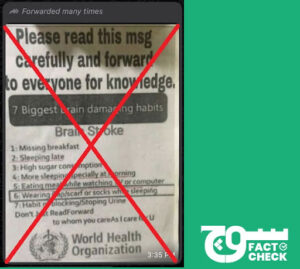
Claim: WHO guidelines on brain stroke claim 7 “biggest brain damaging habits”
Fact: The claim is false, as the WHO had not declared such a list.
On 29 January 2023 and again on 9 February 2023, Soch Fact Check received a viral image on WhatsApp which claimed the World Health Organization (WHO) identified seven habits that are major causes of brain damage and lead to a stroke. The list of habits includes:
- skipping breakfast,
- staying up late,
- consuming high amounts of sugar,
- sleeping excessively, particularly in the morning,
- eating while watching TV or using the computer,
- wearing headgear or socks while sleeping,
- and delaying urination.
The image was labelled “forwarded many times” by WhatsApp.

Fact or Fiction?
Soch Fact Check could not find any specific reference to such a list or graphic attributed to WHO on any of the public health organisations websites or social media pages.
Google Reverse Image Search could not identify the images original source online. However, we found that the same claim has gone viral on WhatsApp in other Asian countries. We found an AFP Philippines report that stated local WHO officers had denied the WHO authored the post, further affirming that the WHO had not issued such a list of brain damaging habits.
This viral message had been shared in Nigeria a few years ago too, and WHO Nigeria had also denied the body issued it, as reported by the ICIR.
The WHO did not declare such a list of seven brain damaging habits and these claims have been debunked by multiple reputable sources. It is important to note, however, experts do recognize that some of these habits, such as sleep deprivation, can negatively impact brain health.
Virality
The WhatsApp forwarded image was labeled “forwarded many times”.
Soch Fact Check also conducted a search on Facebook, Twitter and Instagram and found that different variations of the same text labeled as “7 brain damaging habits” has been viral on these platforms in various years from 2017 to now. Some of them can be seen here, here, here, here, here, and here. A lot of the posts from 2017 and 2021 were already fact-checked by third-party fact-checkers, which adds to the virality of this claim.
Conclusion: Viral WHO guidelines about chances of brain stroke are false and not issued by WHO.
